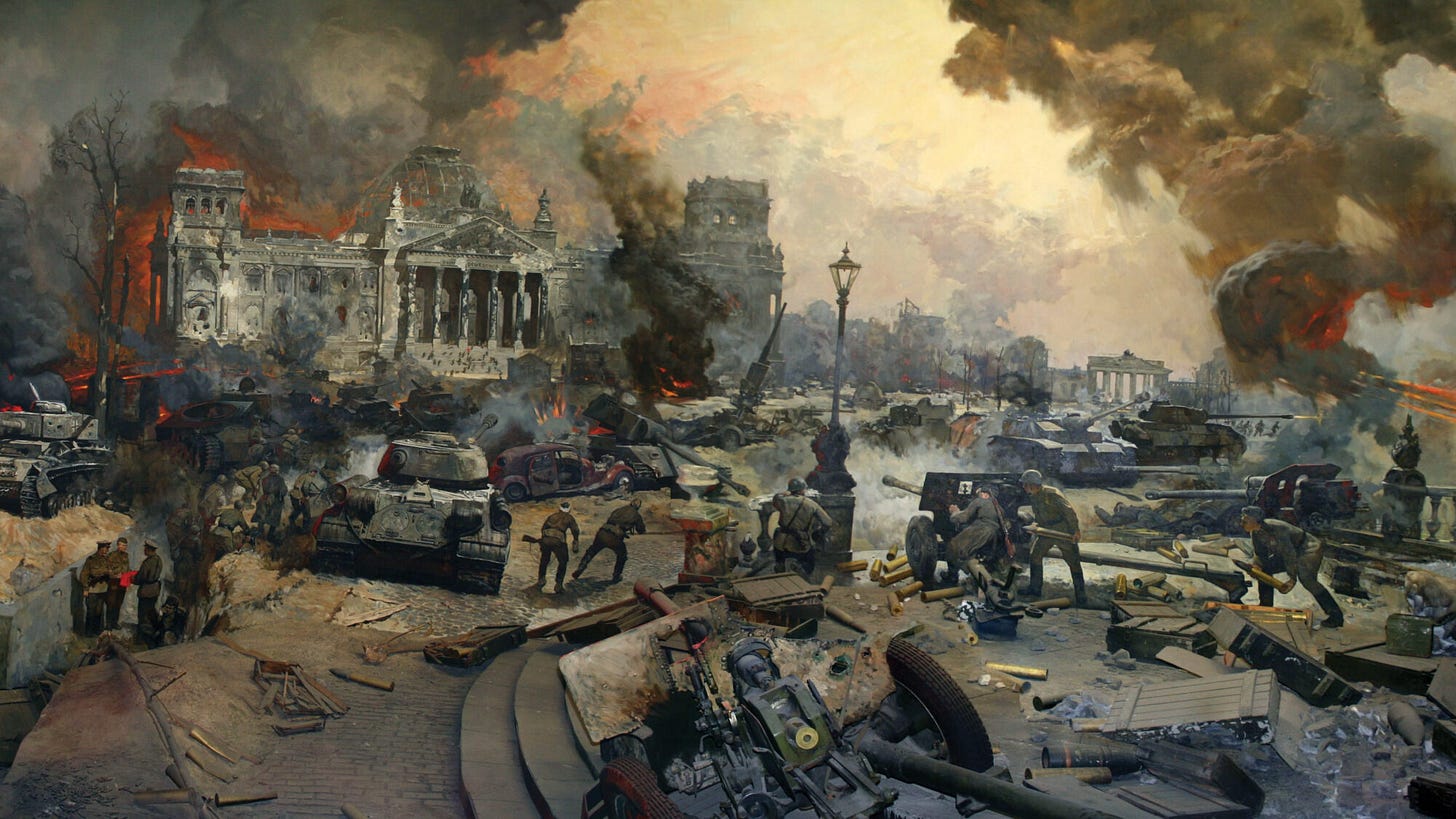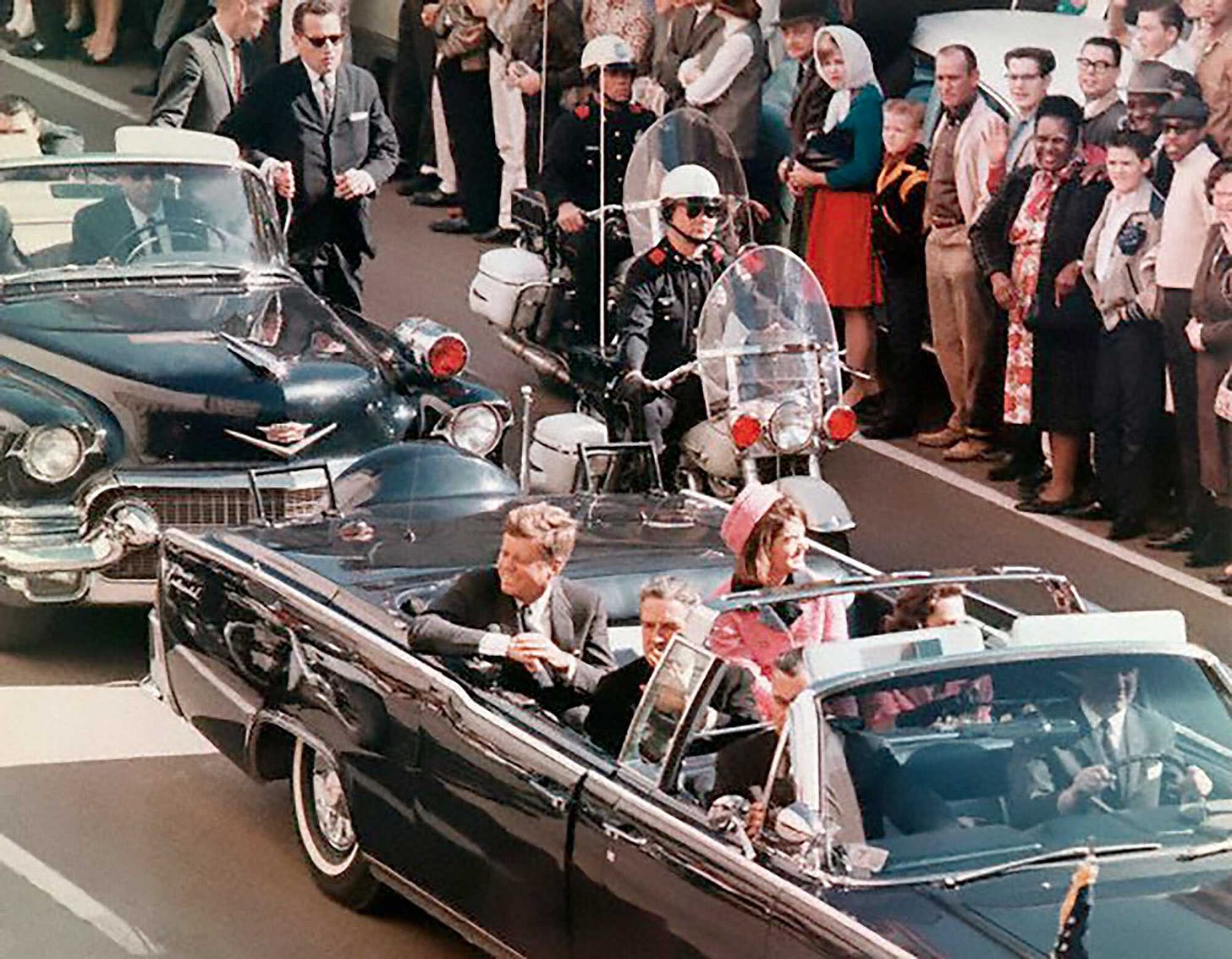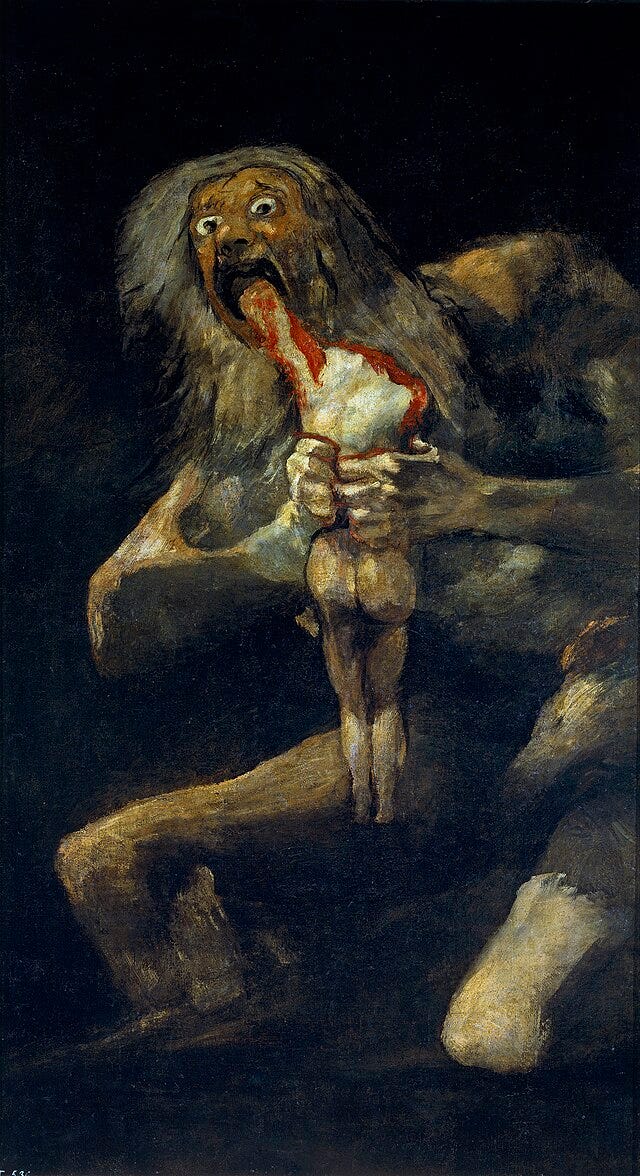Gravity's Rainbow - Part 3 - Chapter 7: The Illusion of Will
Analysis of Gravity's Rainbow, Part 3 - Chapter 7: Slothrop's Hashish Adventure, the Sacramental City, the Death of FDR, Potassium Permangenate, Slothrop in Potsdam, The White House
Well, it’s time for Slothrop to go fetch that hashish, though he’s beginning to have some second thoughts. He awakes from their night of fun, and, nearly immediately, Säure gives him the physical address of the hashish that he will be recovering from Neubabelsberg — the same address at which, recently during the Potsdamn Conference, it was decided that Germany would be occupied by foreign forces, specifically, Americans, British, Soviets, and French (many of whom we have already seen making the start of their occupation by searching for the Schwarzgerät and other German military/rocket hardware/intelligence). So, while this address may have literally stated that the occupation and division of Germany into Zones among these occupying forces of ‘good’ was meant to extract reparations and subdue any last vestiges of evil, we have already seen that the true reason these Allies are here is to extract the evil they were supposed to subdue and use it for their own devices.
Säure gives him the rundown of getting into Potsdam/Neubabelsberg which includes a series of maneuvers that Slothrop does not think feasible and which Säure scoffs at, commenting that this will be Slothrop’s problem and not his own. He does provide a little help though — a map from Bodine and an AGO (Adjutant General’s Office) Card which is known to get people across these more difficult territorial lines. Slothrop still questions why he has to be the one to attain the hashish, not Säure — “‘It’s not my specialty’” — or Bodine — “‘He’s already on his way back to Cuxhaven1’” — and the answer is simple enough: “‘Buccaneering is for Rocketman’” (372). So, he begins looking over the maps, not immediately realizing, just as he failed to realize the night before, that he “wasn’t Rocketman, until just a couple hours ago” (371). Like everything, Slothrop’s immediate predicament seems to be purposefully set up by some greater power; but is he developing a tolerance to these pieces of knowledge, having experienced so many of them that he (or even we) begins to start questioning our own doubts, thinking them to be equally or even more insane than the situations we are in?
Slothrop pictures Berlin as he has seen it in the National Geographic that has now warped into something entirely new: a City Sacramental. If such a city existed, one in which “the city [was an] outward and visible sign of inward and spiritual illness or health,” (372) this city would present its inward condition outwardly — which it obviously is. But it is not just a suffering city that looks as if it is suffering. Not simply human death represented in the crumbling walls and skeletal remnants of a city’s remaining architecture, for that would be too obvious. Instead, this city embodies the Sacrament: a death of spirit, one which was marred with the end of WWI, but not destroyed. One that could have been revitalized, given life, breathed another day of pure air. Instead, we are here seeing more than a bombed-out city; we are seeing one whose insides have not only merged with the exterior world, but whose interior no longer possesses anything except the same walls as the outside. No soul, no functional organs, just featureless concrete, dead flesh. A body turned inside out; a lost and sacrificed city.
Nonetheless, Slothrop sees hope in the destruction of this city. Despite its loss, it can revert into something more natural than what humanity has deemed natural: “The straight-ruled boulevards […] are now winding pathways […] their shapes organic” (373). The world, before we arrived at each new landmass, was not so organized as a city happens to be — structures with straight ninety-degree angles, trees spaced evenly apart with gravel covering each spot of dirt between. There were no concrete masses built in uniformity. Instead, the world emerged and evolved naturally, ununiform, like the jagged branches and offshoots of trees in a forest — each arising from some spot randomly determined by the wind of a world that did still have a spirit. And now, this City Sacramental begins to emerge as such a natural occurrence. It had to be burned to a pulp before it arose again as that which a god would have wanted it to. But, even with this emergence, certain factors cannot be erased while those who remember them still live: advertisements stamped with the face of Hitler, swastikas waving on the branches and trunks of trees, the knowledge that we, our spirits even, have been starved and oppressed so that Theirs could flourish, overcome with wealth. The City Sacramental is a microcosm representing the entirety of the Zone: a world wiped back to its bare bones, ready to be rebuilt, but never able to leave behind the more blatant aspects of its destruction. The issue arises when we know that the Zone is not the world, and the world is still run by those who will rebuild the City Sacramental, the Zone, to their own desire.
As Slothrop and Säure still sit in the Chicago Bar, Slothrop learns that Truman has replaced Roosevelt as the US President, given Roosevelt died right before the surrender. Slothrop is genuinely devastated by this piece of information given Roosevelt was his favorite president. He, still young in his years, idolized Roosevelt as a president who had merit — one who fought through whatever disability he may have had and done what is best for the working class person.2 But FDR was not allowed to live for long, and as Slothrop pondered, maybe this death was not a natural one, for what are the chances that he, Hitler, and Mussolini all passed within mere weeks of each other? Why would investigations by his own family be opened up and then hidden from the public eye? And would other presidents in America’s future similarly die? Would questions of the death’s authenticity be pushed to the background and labeled as conspiracy as well? Well, yes. In fact, they would.
While “‘They said it was a stroke,’” (374) Slothrop has his reservations. From realms in his mind that he does not know exist (because these realms are being drawn by Pynchon from the future, the American 1960s) the assassination of another president arises. Even here though, in the 40s, Slothrop perceives these possibilities, seeing Roosevelt as a person that They could assemble to achieve some specific goal and then dismantle when either that goal has been achieved or Their creation has grown a will of its own. Slothrop is even seeing a parallax — the possibility that this event can be viewed from two different time periods, perhaps even two different assassinated presidents. And if we are (as we most definitely are in Gravity’s Rainbow) viewing the American 1960s through the events of the world’s 1940s, this is a clear commentary on the assassination of JFK (one of the only other few presidents referred to by their three initials), a president killed for his desire to dismantle the CIA, for being slightly more sympathetic to the Communists and to Cuba, for not blindly following along with what They wanted him to follow along with, and so on. Could FDR, too, have met such a fate?
At this moment, it is approaching noon: The Evil Hour. Looking back at 3.6, we see Slothrop viewing the story of Tannhäuser and Frau Holda. Here again, Slothrop ponders on the myth. Within the story, the Evil Hour is when Frau Holda, the temptress — our temptress — can appear under a different guise, both a beautiful young maiden and one who looks as the devil. We see this Evil Hour giving the death of a president as both a natural and planned death. We see Säure attempting to help and attempting to control Slothrop. We see Berlin with and without a soul — from the Inside and the Outside. It is an hour where dichotomies arise and where turning points are met. And this hour will appear a number of times as we continue.
As they sit out on a cafe sidewalk, Slothrop begins to discuss the Rocket with Säure. It is more than just the mechanics and symbolic nature of the Rocket this time though. It’s the Rocket’s overall effect on the market itself: how the Rocket’s creation warps the surrounding individual markets, drawing out supplies that black products from black markets (another perversion of black/schwarz?), such as cocaine, need to survive. The Rocket requires potassium permanganate, a chemical that was required to synthesize cocaine, thus rendering that market defunct for the time being. The cocaine market dropped so heavily that sales of faux cocaine such as powdered milk became a typical scam which in turn impacted the market of non-perishable foods that were so necessary to the wartime population. The Rocket has a more powerful hand than the hand of God, for God was thought to merely affect the physical and spiritual realms of the world whereas this machine was able to work the market’s invisible hand as if it were a puppet. But it is not as if the Rocket necessarily wanted the cocaine market or any other markets of the sort to be rendered defunct. Those who created the rocket likely desired black markets around the world to continue, for it benefitted Them both economically and otherwise. Instead, markets would now build themselves around the desires of the Rocket as opposed to vice versa. The power and subjugating nature of the Rocket will take God’s place and will bend the world and the economy to its will.
Through this conversation, Säure reveals to Slothrop that the Russians have been abducting some of his men, interrogating them in hopes of finding the Rocket, and that Tchitcherine is at the head of these interrogations, currently working out of a Potsdam film studio. Obviously, this perturbs Slothrop given he has already had bad experiences with Tchitcherine despite never having met the guy, but it also gives Slothrop the idea, or the bravery, to “ask if Säure has heard anything about the Schwarzgerät” (376) which in turn makes him nervous as well. Clearly he knows something, but is unwilling to say. Though he does give Slothrop the advice of finding a man named der Springer who he assures Slothrop that, even though he is unsure where this der Springer is, they will meet. And with that, Slothrop is off to Potsdam under a new alias — the one given to him on the AGO card: Max Schlepzig3.
The journey starts with the presentation of his AGO card to a sentry, who makes a call, subsequently taking Slothrop’s boots (Tchitcherine’s boots really, the ones which Geli gave him in 3.1) and Slothrop immediately believes he has been caught by the man himself. But they are returned, perhaps a little too easily. And also, perhaps a little too easily, Slothrop is later able to hijack a boat to take down the canal that Säure told him about earlier. The further he gets toward Potsdam, the denser the sentries become, and Slothrop initially thinks that this is it for him. But he keeps going, unseen, invisible, and believes that “Their preoccupation is with forms of danger the War has taught them” which is “a set of threats [Slothrop] doesn’t belong to” (379). And while this is likely true to some extent, that They have a power so great our mere presence poses virtually no threat to them, Slothrop continues to become far too acclimated to the coincidences of the steps in his journey. His perception for the behind-the-scenes workings, what many would call his paranoia, are waning.
Slothrop, having successfully traversed the canal, now comes across the highway he was told about. On this highway, which is nigh impossible to cross, “Each driver thinks he’s in control of his vehicle, each thinks he has a separate destination, but Slothrop knows better. The drivers are out tonight because They need them where they are, forming a deadly barrier” (380). It should (if you’ve read The Crying of Lot 49) call to mind Oedipa’s first viewing of San Narciso, looking at the roads and highways as a circuit board where each path leads to a specific destination that They want you to arrive at, never passing through those They want you to ignore. Similarly, the drivers of this highway, this Autobahn, believe they have the freedom to traverse it in whichever direction, whatever time of day, and at whatever speed they desire. And this is true. But the start and end points are the same. Each exit is built in a specific spot, not allowing one to leave the road too soon or too late. And the road exists along this stretch of land specifically, not a mile to the east or west, but here, where They need it to be, to form that deadly barrier. They, again, present the illusion of free will, and give us access to the minutiae we desire so deeply while using us against each other.
And Slothrop just runs right across, not a scratch on him.
Here he is in Potsdam, having arrived thanks to the accuracy of Pig Bodine’s map with just one question: how did Bodine forget to mention that much of the town had been commandeered for the Conference and is now under far higher security than anticipated. But given this district was akin to Hollywood, Slothrop easily passes as a movie star in the guise of a superhero.
The hashish is at the most heavily guarded house in the district, one labeled as The White House. This address, as Säure stated, is where the decision to break Germany into Zones was made. It is no surprise that this is its given, temporary name, for the real White House has always been a facility which enacted laws or orders under one stated purpose, when in reality, the real purpose reached far further toward realms we would not approve of if they were known4. But again, he makes his way in, unseen, and finds the hashish buried under a juniper bush. Right before he can make his escape, Mickey Rooney — yes, the real Mickey Rooney — steps out on the veranda and spots him. Behind, in the open doors, Slothrop sees what one would expect to see in The White House: those who looked like Churchill and Truman, and who is to say that it was not them, still here after the conference, now conferring with actors and singers in an occupied territory that they now deem under their control. Using the land for their own pleasures.
Slothrop escapes with the hashish . . . momentarily. He makes his way out of the compound and tastes freedom. But a pair of metal teeth — teeth from the metallic body of Vaslav Tchitcherine — await him with a quick anesthetic. Yes, Tchitcherine tells him, “‘You were followed all the way’” (383). As Slothrop falls under the effects of the drug, he, like we did earlier, likely realizes he has become too accustomed to everything working out for him recently. But it is too late once again.
Up Next: Part 3, Chapter 8
We have officially reached the halfway point of Gravity’s Rainbow! Thanks to all who have followed along so far, both old and new readers or any readers still to come. I’ve loved writing these posts and they have opened up my mind to the many nuances and readings possible in the novel, far more than I initially predicted I would be covering. Looking forward to however many more are to come!
Likely to attend the rocket tests and interrogations known as Operation Backfire. This operation helped discover the assemblage of the V-2 rocket through testing and interrogation of German personnel.
And though I don’t think it’s a thematically important part of the novel, I do have to mention that “Lloyd Nipple, the fattest kid in Mingeborough” (374) has to be Pynchon’s funniest (or at least one of his funniest) names in any of his novels.
Franz Pökler had a job where we saw him posting up posters for a Max Schlepzig film far in the past (1.19, pg. 160), so it seems that this identity is not purely fabricated.
Again, it was stated that the Zones would help for the management and rebuilding of Germany, when in reality, we see those scouts from other countries now searching for the Rocket to use as their own. I’m sure you can think of many modern examples, as well.









Here's FDR in: "whoever it was, posing in the black cape at Yalta with the other leaders, conveyed beautifully the sense of Death's wings, rich, soft and black as the winter cape, prepared a nation of starers of the passing of Roosevelt, a being They assembled, a being They would dismantle..."
https://todaysdocument.tumblr.com/post/110074997967/the-yalta-conference-cloak-the-photos-of-the-big
Here's the Wiki for the Captain Midnight Radio Hour (which was the Rocket to Saure) https://en.wikipedia.org/wiki/Captain_Midnight
Saure: "Looking to spend my last several decades as the Sublime Rossini did his: comfortable."
Internet: "Rossini’s health complications were also a factor in his choice to retire at the age of 37 as he suffered from both urethritis and arthritis as well as bouts of depression and possibly bipolar disorder."
Jubilee Jim was a nickname of robber baron James Fisk -- I have no idea how to interpret that in the context of Rocketman's little ditty...any thoughts? Coincidence?
Looked up Fritz von Opel, and of course he was the founder of the car company, but I didn't know he was so closely tied to rocketry: He is remembered mostly for his Opel RAK demonstrations of the world's first manned rocket-powered ground and air vehicles that earned him the nickname "Rocket Fritz" and which were also highly effective as publicity stunts for his family's automotive business.
hauptstufe = main stage ... ?